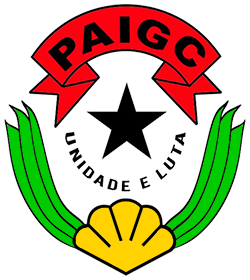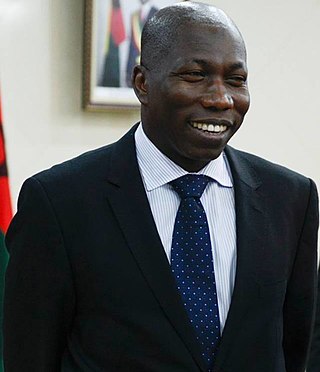Related Research Articles

Guinea-Bissau, officially the Republic of Guinea-Bissau, is a country in West Africa that covers 36,125 square kilometres (13,948 sq mi) with an estimated population of 2,026,778. It borders Senegal to its north and Guinea to its southeast.

The Revolutionary Armed Forces of the People is the national military of Guinea-Bissau. It consists of an army, a navy, an air force, and paramilitary forces. The World Bank estimated that there were around 4,000 personnel in the armed forces. The estimated military expenditure are $23.3 million, and military spending as a percentage of GDP is 1.7%.

The Republic of Guinea-Bissau follows a nonaligned foreign policy and seeks friendly and cooperative relations with a wide variety of states and organizations. France, Portugal, Angola, Brazil, Egypt, Nigeria, Libya, Cuba, the Palestine Liberation Organization, Ghana, and Russia have diplomatic offices in Bissau.

Aristides Maria Pereira was a Cape Verdean politician. He was the first President of Cape Verde, serving from 1975 to 1991.

Kumba Ialá Embaló, also spelled Yalá, was a Bissau-Guinean politician who was president from 17 February 2000 until he was deposed in a bloodless military coup on 14 September 2003. He belonged to the Balanta ethnic group and was President of the Social Renewal Party (PRS). In 2008 he converted to Islam and took the name Mohamed Ialá Embaló. He was the founder of the Party for Social Renewal. In 2014, Ialá died from a cardiopulmonary arrest.

The African Party for the Independence of Guinea and Cape Verde is a political party in Guinea-Bissau. Originally formed to peacefully campaign for independence from Portugal, the party turned to armed conflict in the 1960s and was one of the belligerents in the Guinea-Bissau War of Independence. Towards the end of the war, the party established a socialist one-party state, which remained intact until multi-party democracy was introduced in the early 1990s. Although the party won the first multi-party elections in 1994, it was removed from power in the 1999–2000 elections. However, it returned to office after winning parliamentary elections in 2004 and presidential elections in 2005, since which it has remained the largest party in the National People's Assembly.

João Bernardo "Nino" Vieira was a Bissau-Guinean politician who served as President of Guinea-Bissau from 1980 to 1999, except for a three-day period in May 1984, and from 2005 until his assassination in 2009.
Manuel Saturnino da Costa was a Bissau-Guinean politician who served as Prime Minister of Guinea-Bissau from 26 October 1994 to 6 June 1997.
Carlos Correia was a Bissau-Guinean politician who was Prime Minister of Guinea-Bissau from 17 September 2015 to 12 May 2016. Previously he was Prime Minister from 27 December 1991 to 26 October 1994, from 6 June 1997 to 3 December 1998, and from 5 August 2008 to 25 December 2008.
This name uses Portuguese naming customs. the first or maternal family name is Ndafa and the second or paternal family name is Kabi.

Parliamentary elections were held in Guinea-Bissau on 16 November 2008. The result was a victory for the African Party for the Independence of Guinea and Cape Verde (PAIGC), which won 67 out of the 100 seats in the National People's Assembly, while the Party for Social Renewal (PRS) won 28 seats.

Baciro Djá is a Bissau-Guinean politician who was the prime minister of Guinea-Bissau from 27 May 2016 to 18 November 2016. He was previously prime minister from 20 August 2015 to 17 September 2015.

On 12 April 2012, a coup d'état in Guinea-Bissau was staged by elements of the armed forces about two weeks before the second round of a presidential election between Carlos Gomes Júnior and Kumba Ialá. The coup started in the evening with military personnel and equipment making its way onto the streets, followed by the state-owned media being taken off-air.
Francisco Santos da Silva Júnior is a Bissau-Guinean professional footballer who plays as a midfielder. He represented Portugal internationally at under-19 and under-21 level, before being called up to the Guinea-Bissau senior team in 2017.

Domingos Simões Pereira is a Bissau-Guinean politician who was Prime Minister of Guinea-Bissau from 2014 to August 2015. He previously served as Executive Secretary of the Community of Portuguese Language Countries, also known as the Lusophone Commonwealth, from 2008 to 2012.

Umaro Mokhtar Sissoco Embaló is a Bissau-Guinean politician serving as the president of Guinea-Bissau since February 2020. He is a political scientist and military officer who previously served as prime minister between November 2016 and January 2018.